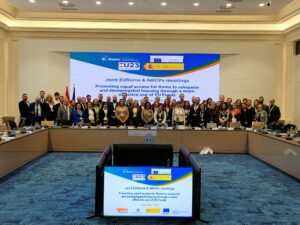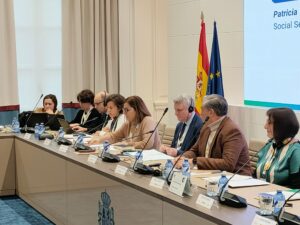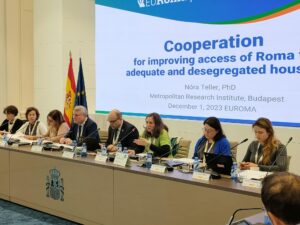The meeting was jointly organised with the 22nd NRCPs meeting, led by European Commission DG Justice, and under the Spanish EU Presidency. It followed, and aimed to complement, the European Platform for Roma Inclusion held the day before.
 On 1 December, EURoma Network organised its second meeting of 2024 in Madrid under the Spanish EU Presidency. The meeting was jointly organised with the 22nd National Roma Contact Points (NRCPs) meeting, led by European Commission (Directorate General for Justice and Consumers). It followed, and complemented, the European Platform for Roma Inclusion (EPRI) the day before.
On 1 December, EURoma Network organised its second meeting of 2024 in Madrid under the Spanish EU Presidency. The meeting was jointly organised with the 22nd National Roma Contact Points (NRCPs) meeting, led by European Commission (Directorate General for Justice and Consumers). It followed, and complemented, the European Platform for Roma Inclusion (EPRI) the day before.
Joint EURoma Network and 22nd NRCPs meetings gathered representatives of the public authorities in charge of the European Cohesion Policy Funds (notably ESF/ESF+ and ERDF) and of the National Roma Contact Points of the 15 EURoma partner countries as well as representatives of the National Roma Contact Points from the other EU Member States. In addition to DG Justice, the meeting also counted on the participation of representatives of those European Commission DGs related to the ERDF and the ESF+.
The meeting focused on the promotion of an equal access for Roma to adequate and desegregated housing, analysing approaches and strategies as well as the role of ESF+ and ERDF, in combination with other EU and national funds, to this end.
Opening of the meeting
 The meeting was opened by Patricia Bezunartea, General Director of Family Diversity and Social Services, as Spanish NRCP, and Szabolcs Schmidt, Head of Unit Non-Discrimination, Anti-Racism and Roma Coordination, DG Justice and Consumers.
The meeting was opened by Patricia Bezunartea, General Director of Family Diversity and Social Services, as Spanish NRCP, and Szabolcs Schmidt, Head of Unit Non-Discrimination, Anti-Racism and Roma Coordination, DG Justice and Consumers.
Reflections and lessons learnt on tackling the situation of Roma living in slums and substandard segregated
The experience in the Region of Madrid to tackle the situation of those persons living in slums was presented as a case study, which allowed to put on the table relevant aspects for further consideration and exchange among participants.
Eusebio González, Managing Director of the Social Housing Agency of the Region of Madrid, presented the experience of this public body, paying particular attention to the lessons learnt over these decades of intervention and the elements that, based on its experience, are considered key for success.
Rocío García, FSG Regional Director of the Region of Madrid, then focused on the importance of the social accompaniment and crucial elements to take into account.
Participants also had the opportunity to hear the testimonies of two Roma women who have gone through a process of resettlement over the past years and exchange with them about their experience and about how a normalised housing have changed their lives and the lives of their families, not only in terms of housing but also in all other aspects of live.
 Cooperation between NRCPs and European Cohesion Policy Funds authorities on improving Roma access to adequate and desegregated housing
Cooperation between NRCPs and European Cohesion Policy Funds authorities on improving Roma access to adequate and desegregated housing
NRCPs and ESF+/ERDF authorities exchanged about how cooperation between them is established in their countries in the area of housing and in general. In particular, they presented mechanisms in place for fostering cooperation and reflected on challenges and bottlenecks experienced in these cooperation methods.


